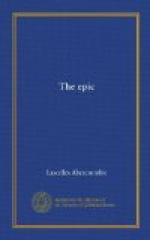meter, hepi m hetekes ge minynthadion
per heonta,
timen per moi hophellen Olympios engyalixai
Zeus hypsibremetes.[8]
*
* * * *
timeson moi yion hos hokymorotatos hallon
heplet’.[9]
Minunthadion—hokymorotatos: those are the imporportant words; key-words, they might be called. If we really understand these lines, if we see in them what it is that Agamemnon’s insult has deprived Achilles of—the sign and acknowledgment of his fellows’ admiration while he is still living among them, the one thing which makes a hero’s life worth living, which enables him to enact his Hell—we shall scarcely complain that the Iliad is composed on a second-rate subject. The significance of the poem is not in the incidents surrounding the “Achilleis”; the whole significance is centred in the Wrath of Achilles, and thence made to impregnate every part.
Life is short; we must make the best of it. How trite that sounds! But it is not trite at all really. It seems difficult, sometimes, to believe that there was a time when sentiments now become habitual, sentiments that imply not only the original imperative of conduct, but the original metaphysic of living, were by no means altogether habitual. It is difficult to imagine backwards into the time when self-consciousness was still so fresh from its emergence out of the mere tribal consciousness of savagery, that it must not only accept the fact, but first intensely realize, that man is hokymorotatos—a thing of swiftest doom. And it was for men who were able, and forced, to do that, that the Iliad and the Odyssey and the other early epics were composed. But life is not only short; it is, in itself, valueless. “As the generation of leaves, so is the generation of men.” The life of man matters to nobody but himself. It happens incidentally in universal destiny; but beyond just happening it has no function. No function, of course, except for man himself. If man is to find any value in life it is he himself that must create the value. For the sense of the ultimate uselessness of life, of the blankness of imperturbable darkness that surrounds it, Goethe’s word “Hell” is not too shocking. But no one has properly lived who has not felt this Hell; and we may easily believe that in an heroic age, the intensity of this feeling was the secret of the intensity of living. For where will the primitive instinct of man, where will the hero, find the chance of creating a value for life? In danger, and in the courage that welcomes danger. That not only evaluates life; it derives the value from the very fact that forces man to create value—the fact of his swift and instant doom—hokymorotatos once more; it makes this dreadful fact enjoyable. And so, with courage as the value of life, and man thence delightedly accepting whatever can be made of his passage, the doom of life is not simply suffered; man enacts his own life; he has mastered it.




